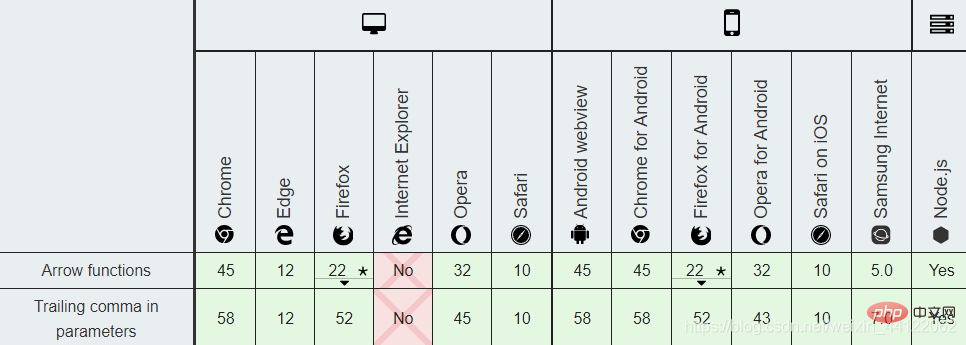es6 => what does it mean
In es6, "=>" refers to arrow function, which is an abbreviation of a function. The syntax is (parameter)=>{function body};". Arrow functions have no prototype, no this, arguments, super and "new.target" are bound, and their value is determined by the nearest non-arrow function in the periphery; it cannot be called through the new keyword.

The operating environment of this tutorial: Windows 7 system, ECMAScript version 6, Dell G3 computer.
=> is an arrow function, which is a new function added to the ES6 standard. As the name suggests, Arrow functions are a new syntax that uses arrows (=>) to define functions. The syntax of arrow function expressions is more concise than function expressions, but it is slightly different from traditional JavaScript functions, mainly focusing on the following aspects:
There is no binding of this, super, arguments and new.target, and its value is determined by the nearest non-arrow function in the periphery.
Cannot pass the new key Word call
No prototype
The binding of this cannot be changed
arguments are not supported Object
does not support repeated named parameters
The point of this in the function body always points to the object in which it is defined, not to The object that calls it, we know who executes the function in es5 and who it points to.
Basic Syntax
(param1, param2, …, paramN) => { statements }
(param1, param2, …, paramN) => expression
//相当于:(param1, param2, …, paramN) =>{ return expression; }
// 当只有一个参数时,圆括号是可选的:
(singleParam) => { statements }
singleParam => {statements }
// 没有参数的函数应该写成一对圆括号:
() => { statements }Simple example
x => x * x
That is equivalent to:
function (x) {
return x * x;
}Shorter function example
var elements = [
'Hydrogen',
'Helium',
'Lithium',
'Beryllium'
];
elements.map(function(element) {
return element.length;
}); // 返回数组:[8, 6, 7, 9]
// 上面的普通函数可以改写成如下的箭头函数
elements.map((element) => {
return element.length;
}); // [8, 6, 7, 9]
// 当箭头函数只有一个参数时,可以省略参数的圆括号
elements.map(element => {
return element.length;
}); // [8, 6, 7, 9]
// 当箭头函数的函数体只有一个 `return` 语句时,可以省略 `return` 关键字和方法体的花括号
elements.map(element => element.length); // [8, 6, 7, 9]
// 在这个例子中,因为我们只需要 `length` 属性,所以可以使用参数解构
// 需要注意的是字符串 `"length"` 是我们想要获得的属性的名称,而 `lengthFooBArX` 则只是个变量名,
// 可以替换成任意合法的变量名
elements.map(({ "length": lengthFooBArX }) => lengthFooBArX); // [8, 6, 7, 9]Ternary operator example
Arrow functions can also use conditional (ternary) operators:
var simple = a => a > 15 ? 15 : a;
simple(16); // 15
simple(10); // 10
let max = (a, b) => a > b ? a : b;Not used with new
Arrow functions cannot be used As a constructor, an error will be thrown when used with new.
var Foo = () => {};
var foo = new Foo(); // TypeError: Foo is not a constructorNo prototype attribute
The arrow function has no prototype attribute.
var Foo = () => {};
console.log(Foo.prototype); // undefinedFunction body
Arrow functions can have an "abbreviated body" or a common "block body".
In an abbreviated body, only one expression is required, appended with Implicit return value. In the block body, an explicit return statement must be used.
var func = x => x * x;
// 简写函数 省略return(简写体)
var func = (x, y) => { return x + y; };
//常规编写 明确的返回值(块体)Arrow function recursion
var fact = (x) => ( x==0 ? 1 : x*fact(x-1) );
fact(5); // 120Browser compatibility

[Related recommendations: javascript video tutorial, web front-end]
The above is the detailed content of es6 => what does it mean. For more information, please follow other related articles on the PHP Chinese website!

Hot AI Tools

Undresser.AI Undress
AI-powered app for creating realistic nude photos

AI Clothes Remover
Online AI tool for removing clothes from photos.

Undress AI Tool
Undress images for free

Clothoff.io
AI clothes remover

AI Hentai Generator
Generate AI Hentai for free.

Hot Article

Hot Tools

Notepad++7.3.1
Easy-to-use and free code editor

SublimeText3 Chinese version
Chinese version, very easy to use

Zend Studio 13.0.1
Powerful PHP integrated development environment

Dreamweaver CS6
Visual web development tools

SublimeText3 Mac version
God-level code editing software (SublimeText3)

Hot Topics
 Is async for es6 or es7?
Jan 29, 2023 pm 05:36 PM
Is async for es6 or es7?
Jan 29, 2023 pm 05:36 PM
async is es7. async and await are new additions to ES7 and are solutions for asynchronous operations; async/await can be said to be syntactic sugar for co modules and generator functions, solving js asynchronous code with clearer semantics. As the name suggests, async means "asynchronous". Async is used to declare that a function is asynchronous; there is a strict rule between async and await. Both cannot be separated from each other, and await can only be written in async functions.
 How to reverse an array in ES6
Oct 26, 2022 pm 06:19 PM
How to reverse an array in ES6
Oct 26, 2022 pm 06:19 PM
In ES6, you can use the reverse() method of the array object to achieve array reversal. This method is used to reverse the order of the elements in the array, putting the last element first and the first element last. The syntax "array.reverse()". The reverse() method will modify the original array. If you do not want to modify it, you need to use it with the expansion operator "...", and the syntax is "[...array].reverse()".
 How to find different items in two arrays in es6
Nov 01, 2022 pm 06:07 PM
How to find different items in two arrays in es6
Nov 01, 2022 pm 06:07 PM
Steps: 1. Convert the two arrays to set types respectively, with the syntax "newA=new Set(a);newB=new Set(b);"; 2. Use has() and filter() to find the difference set, with the syntax " new Set([...newA].filter(x =>!newB.has(x)))", the difference set elements will be included in a set collection and returned; 3. Use Array.from to convert the set into an array Type, syntax "Array.from(collection)".
 Why does the mini program need to convert es6 to es5?
Nov 21, 2022 pm 06:15 PM
Why does the mini program need to convert es6 to es5?
Nov 21, 2022 pm 06:15 PM
For browser compatibility. As a new specification for JS, ES6 adds a lot of new syntax and API. However, modern browsers do not have high support for the new features of ES6, so ES6 code needs to be converted to ES5 code. In the WeChat web developer tools, babel is used by default to convert the developer's ES6 syntax code into ES5 code that is well supported by all three terminals, helping developers solve development problems caused by different environments; only in the project Just configure and check the "ES6 to ES5" option.
 Is require an es6 syntax?
Oct 21, 2022 pm 04:09 PM
Is require an es6 syntax?
Oct 21, 2022 pm 04:09 PM
No, require is the modular syntax of the CommonJS specification; and the modular syntax of the es6 specification is import. require is loaded at runtime, and import is loaded at compile time; require can be written anywhere in the code, import can only be written at the top of the file and cannot be used in conditional statements or function scopes; module attributes are introduced only when require is run. Therefore, the performance is relatively low. The properties of the module introduced during import compilation have slightly higher performance.
 What does es6 temporary Zenless Zone Zero mean?
Jan 03, 2023 pm 03:56 PM
What does es6 temporary Zenless Zone Zero mean?
Jan 03, 2023 pm 03:56 PM
In es6, the temporary dead zone is a syntax error, which refers to the let and const commands that make the block form a closed scope. Within a code block, before a variable is declared using the let/const command, the variable is unavailable and belongs to the variable's "dead zone" before the variable is declared; this is syntactically called a "temporary dead zone". ES6 stipulates that variable promotion does not occur in temporary dead zones and let and const statements, mainly to reduce runtime errors and prevent the variable from being used before it is declared, resulting in unexpected behavior.
 Is es6 map ordered?
Nov 03, 2022 pm 07:05 PM
Is es6 map ordered?
Nov 03, 2022 pm 07:05 PM
The map is ordered. The map type in ES6 is an ordered list that stores many key-value pairs. The key names and corresponding values support all data types; the equivalence of key names is determined by calling the "Objext.is()" method. Implemented, so the number 5 and the string "5" will be judged as two types, and can appear in the program as two independent keys.
 Is es2015 the same as es6?
Oct 25, 2022 pm 06:51 PM
Is es2015 the same as es6?
Oct 25, 2022 pm 06:51 PM
es2015 is es6. The full name of es is "ECMAScript", which is a universal scripting language implemented according to the ECMA-262 standard. The version officially released in June 2015 is officially called ECMAScript2015 (ES2015). Because it is the 6th version of ECMAScript, it can Referred to as es6.






